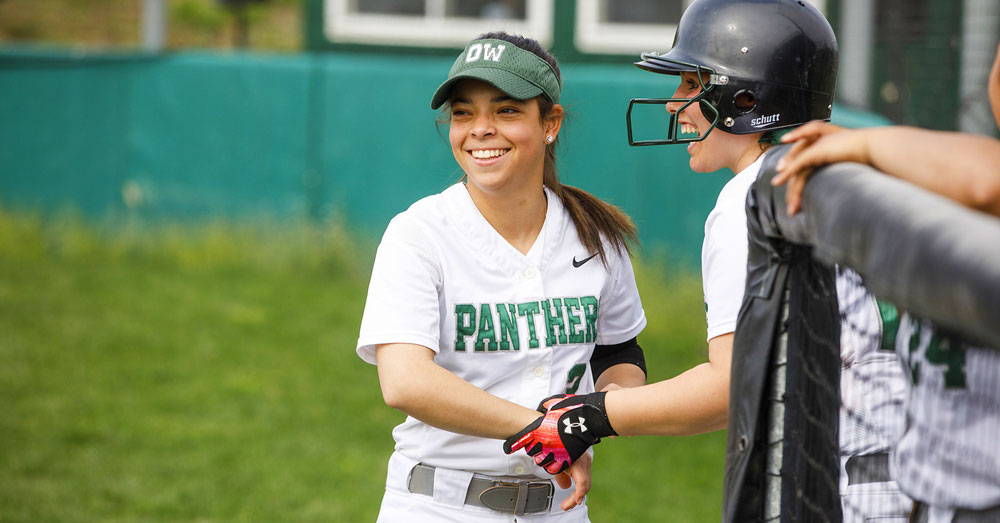A parent’s role in a child’s athletic career has many ups and downs, none higher than when they get a chance to play at an elite level in college. As a parent, the role you play in your child’s college sports recruiting can vary depending on the sport and specific circumstances or milestones in the recruiting process. In general, parents and caregivers can play a significant role in the process; however, it is a delicate balance between advising, guiding, and parenting. Admittedly, it is a balance that I, among many others, continue to learn as our high schoolers start and advance in the recruiting journey.
These are some tips that can help both athlete and parent make the journey to the next level of athletic competition a truly positive experience.
5 Ways to Help Teenagers During Sports Recruiting
After talking to other parents and coaches, I have learned a few ways to help high school students in the college sports recruiting process. You can help your high school athlete by:
- Teaching effective communication
Effective communication is essential in the recruiting process, and you can help your child develop these skills. Your teen may need assistance with crafting emails, texts, or social media direct messages to college coaches. Encourage them to be concise and to the point, express interest in the program, and ask relevant questions. It is common for you to get the “how do I say,” “how do I write,” and “what should I ask” questions when your teen is communicating with college coaches. - Researching colleges and programs
As a parent, you can help your teen research potential colleges and athletic programs. As a parent, you can assist your teen with researching colleges, finding teams on social media, locating rosters and stats, and understanding the program offerings. You will also be coordinating campus visits and tours of the athletics facilities with your student-athlete. - Providing emotional support
The recruiting process can be overwhelming, and your teenager may feel stressed, anxious, or frustrated. Teenage athletes are trying to choose a major, find colleges, and navigate the recruiting process. As a parent, you can provide emotional support by listening to their concerns, offering encouragement, and giving them space to express their emotions. Help them stay organized, teach them time management, and avoid taking control of the process. - Acting as their unpaid PR and social media intern
Social media is complicated when it comes to teenagers and its role in the recruiting process. According to a Cornerstone College Athletics Survey of more than 600 coaches at DI, DII, and DII colleges, 83% of college recruiting staff and coaches do online searches for athletes and track social media activity. There are rules athletes should follow when creating social media accounts, and parents play a significant role in auditing, advising, and overseeing these accounts to make sure students are safe, making smart choices, and getting the right kind of attention for their athletics. Social media is a place where coaches can communicate with student recruits once a sports contact period has begun, and it is a clever way to get exposure. For example, as a parent, you can go live on a student’s social media account when they compete so family, coaches, and friends can watch them compete in real-time or later while scrolling through their feeds. - Stepping back
Junior and senior year of high school is overwhelming. It is a time when students are making a lot of life choices; they are getting 50+ emails a day from college marketing lists; and it also happens to be the time when teenagers listen to their parents less and less — as nature intended — so our instinct is to step in and take over when we should be taking a step back. While it is natural to want to help your child, being overly involved can be counterproductive. It is important to strike a balance between being supportive and helpful while also giving your child the space to take ownership of the process. Help your child learn how to advocate for themselves and listen to their needs and preferences. Avoid being pushy, controlling, or bulldozing your way over challenges and roadblocks they face. High school is stressful enough, and being overly intrusive and intense about the process can cause your teen to shut down completely and shut you out. Make sure they have access to mental health resources and a mentor if they become too overwhelmed.
Absolutely Avoid Doing These
There are several things parents must avoid doing in the sports recruiting process to ensure that their child has the best chance of success and to maintain positive relationships with coaches and programs. As a parent, you must stop:
@becharris30 #parents #athlete #support #encourage #basketball #basketballtips #tips #teammate #team #coach #coachtalk #recruit #recruitment #negativity ♬ Flowers – Miley Cyrus
- Being overly aggressive: It’s not your show to run. The recruiting process is about your high school athlete. While it’s natural to want the best for your child, being overly aggressive or pushy can turn off coaches and make them less interested in recruiting your child.
- Misrepresenting your child’s accomplishments: It’s important to be honest and transparent about your child’s abilities and achievements. Exaggerating or misrepresenting your child’s accomplishments can hurt their chances of being recruited and damage their reputation with coaches.
- Making commitments for your child: Don’t make any plans, commitments, or appointments for your child. They are in charge of their commitments, calendar, and offers. You are not. Accepting an offer or scheduling visits without your child’s input or consent will damage their reputation and relationship with coaches.
- Contacting coaches or recruiters: Fred Bastia, owner and founder of Playced.com, said it best in his USA Today High School Sports column, “coaches want to deal with players, not parents.” Let your child take the lead in communication with coaches, and only step in if necessary or if a coach initiates contact.
- Criticizing, badmouthing, and bench-coaching: We have all heard it, sat next to it, or even done it ourselves, and it is not helping your high school athlete. In fact, your actions on the sidelines and in the stands can determine how a coach views your student, their coachability, and how they might contribute to the overall team dynamic. A parent who badmouths, yells, screams, and criticizes coaches, officials, and other players can turn off a college coach and recruiter. Assume there is always a coach around you and remember that your behavior toward the team and coaches also affects how your teenager acts too.
- Focusing only on athletics and forgetting about the big picture: Don’t forget that the reason for going to college is to get a degree. It is not only about the sport. College student-athletes have unique stressors, such as injury, pressure to perform, physical health, and more, all of which can affect their performance or pull them out of the sport entirely. So, it is important make sure you and the student don’t lose sight of the big picture – the college degree, college experience, and future career. A student needs to want to be at the college just as much as they want to play for it. While you are assisting your high schooler with their athletics, make sure just as much attention is paid to their academics and overall well-being too.
Being a parent of a student-athlete can be both exciting and overwhelming, especially during the college sports recruiting process. It’s essential to understand your role as a parent and to approach the process with the right mindset. By following the dos and don’ts provided, you can help your child navigate the recruiting process and find the best-fit college for them. What other tips would you add to our list of dos and don’ts for parents in college sports recruiting?




